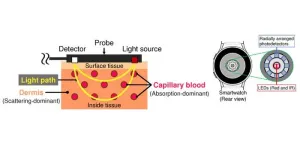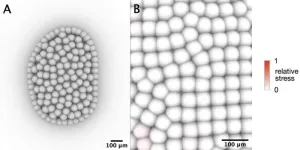(Press-News.org) Brisbane, Queensland, Australia (October 29, 2024) - In a revealing Genomic Press Interview published in Brain Medicine on October 29, 2024, Professor Vicki Clifton shares transformative discoveries about the placenta's unexpected influence on maternal mental health, potentially revolutionizing our understanding of pregnancy-related anxiety and depression.
Professor Clifton's team at the Mater Research Institute-University of Queensland has identified 13 distinct glucocorticoid receptor isoforms in the placenta, with one particular variant showing a surprising response to maternal stress. "We have discovered that the placenta has 13 different isoforms of the glucocorticoid receptor, with one isoform expressed in the presence of maternal stress, anxiety, and depression that activates an inflammatory response in the placenta in the presence of high cortisol concentrations," Professor Clifton explains.
This groundbreaking finding challenges conventional understanding of stress responses during pregnancy. While most glucocorticoid receptors typically suppress inflammation, this newly identified variant appears to enhance it, potentially explaining the complex relationship between stress and inflammation in pregnant women.
Sex-Specific Medicine: A New Frontier
Professor Clifton's research has unveiled crucial differences between male and female fetuses, mediated through sex-specific placental functions. "Presently, we do not consider the sex of the fetus in Obstetrics," she notes. "I would like to see sex-specific medicine for pregnancy complications, for the care of preterm neonates, and for the care of newborns."
Her work suggests that maternal physiology varies depending on fetal sex, opening new possibilities for personalized interventions in pregnancy care. This insight could transform how clinicians approach pregnancy complications and neonatal care.
From Personal Experience to Scientific Innovation
The interview reveals how personal tragedy shaped Professor Clifton's research focus. Following the loss of her son in mid-gestation, she was driven to understand "What went wrong?" This experience led her to study placental function and its regulation by stress hormones, eventually establishing Australia's largest birth cohort study at Mater Research Institute.
Current Research and Future Implications
Professor Clifton's team is investigating how placental inflammation might influence maternal brain function, potentially exacerbating anxiety and depression symptoms during pregnancy. This research could revolutionize our approach to perinatal mental health care and lead to targeted interventions based on placental function.
Professor Vicki Clifton’s Genomic Press interview is part of a larger series that highlights the people behind today’s most influential scientific ideas. Each interview in the series offers a blend of cutting-edge research and personal reflections, providing readers with a comprehensive view of the scientists shaping the future. By combining a focus on professional achievements with personal insights, this interview style invites a richer narrative that both engages and educates readers. This format provides an ideal starting point for profiles that delve into the scientist’s impact on the field, while also touching on broader human themes. More information on the research leaders and research rising stars featured by Genomic Press can be found in our website: https://genomicpress.com.
The full Genomic Press Interview, titled “Vicki L. Clifton: Stress, sex, and the placenta: its role in fetal and child development” is available on 29 October 2024 in Brain Medicine, offering readers an unparalleled opportunity to explore the thoughts and experiences of a highly influential mind in medical research. The article is freely available online at https://url.genomicpress.com/mr3ey5p7
About Brain Medicine: Brain Medicine (ISSN: 2997-2639) is a peer-reviewed journal published by Genomic Press, New York. Brain Medicine is a new home for the cross-disciplinary pathway from innovation in fundamental neuroscience to translational initiatives in brain medicine. The journal’s scope includes the underlying science, causes, outcomes, treatments, and societal impact of brain disorders, across all clinical disciplines and their interface.
END
Maternal health expert professor Vicki Clifton reveals placenta's hidden role in mental health
Groundbreaking research on sex-specific placental function highlighted in exclusive Genomic Press Interview series, advancing personalized pregnancy care
2024-10-29
ELSE PRESS RELEASES FROM THIS DATE:
From concert piano to fear memory research: Dr. Raül Andero Galí bridges mouse-human studies
2024-10-29
Barcelona, Spain (October 29, 2024) - In a compelling new Genomic Press Interview published in Brain Medicine, Dr. Raül Andero Galí reveals how his early passion for classical piano shaped his unique approach to neuroscience research. As an ICREA Research Professor at the Autonomous University of Barcelona, Dr. Andero Galí leads groundbreaking studies that connect mouse and human fear responses, potentially revolutionizing treatments for PTSD and anxiety disorders.
The intersection of stress and memory has captured Dr. Andero Galí's attention throughout his career. "All ...
Arctic whales research collaboration is signed by Heriot-Watt University and HX Expeditions (Hurtigruten Expeditions)
2024-10-29
Pioneering research to protect and conserve Arctic whale populations is to begin under a new five-year collaboration between Heriot-Watt University in Edinburgh, Scotland and HX Expeditions (Hurtigruten Expeditions), a world leader in travel exploration.
The partners have signed a five-year Memorandum of Understanding (MoU), beginning in 2024, to research challenges facing marine life in the high Arctic – the most northern part of the Arctic region and one of the world’s most fragile ecosystems.
The agreement will see Heriot-Watt University and HX work together on the Whales & Arctic Vessels Project (WAVE), ...
Scientists develop tool to predict sepsis in apparently healthy newborns
2024-10-29
A genetic signature in newborns can predict neonatal sepsis before symptoms even start to show, according to a new study.
The study, led by UBC and SFU researchers in collaboration with the Medical Research Council (MRC) Unit The Gambia, has the potential to help healthcare workers diagnose babies earlier, including in lower- and middle-income countries (LMICs) where neonatal sepsis is of particular concern. The research, published today in eBiomedicine, is funded by the National Institutes of Health and the Canadian Institutes of Health Research.
“Neonatal sepsis is caused by the body’s irregular response ...
AI algorithm accurately detects heart disease in dogs
2024-10-29
Researchers have developed a machine learning algorithm to accurately detect heart murmurs in dogs, one of the main indicators of cardiac disease, which affects a large proportion of some smaller breeds such as King Charles Spaniels.
The research team, led by the University of Cambridge, adapted an algorithm originally designed for humans and found it could automatically detect and grade heart murmurs in dogs, based on audio recordings from digital stethoscopes. In tests, the algorithm detected heart murmurs with a sensitivity ...
What animal societies can teach us about ageing
2024-10-29
Red deer may become less sociable as they grow old to reduce the risk of picking up diseases, while older house sparrows seem to have fewer social interactions as their peers die off, according to new research which shows humans are not the only animals to change our social behaviour as we age.
A collection of 16 studies, including six from the University of Leeds, have been published today as part of a special issue of the Philosophical Transactions of the Royal Society, investigating ageing and society across the natural world.
One study into red deer shows that ...
Enhancing the accuracy of wearables that measure blood glucose levels
2024-10-28
Diabetes is an increasingly pervasive disease, currently affecting over 500 million adults worldwide. Since there is as yet no cure for type 1 or type 2 diabetes, patients must regularly monitor their BGLs to keep them in check. Though BGL-measuring devices relying on painful finger pricks have been the gold standard for decades, modern technology is slowly opening doors to better alternatives.
Many researchers have proposed noninvasive methods to monitor BGLs using widely available wearable devices, such as smartwatches. For example, by placing the LEDs ...
Increasing social supports for new mothers with opioid use disorder
2024-10-28
Opioid use disorder (OUD) is a growing public health problem among pregnant and parenting people in the U.S. Between 1999 and 2014, the number of pregnant women with OUD increased by more than four times. This trend also coincides with a rise in pregnancy-associated maternal overdose mortality.
Researchers at Thomas Jefferson University, led by Meghan Gannon, PhD, MSPH, investigated how community-based supports, like doulas, can be integrated into health care for mothers who use opioids. Using a social network analysis, ...
Mitigating the neurotoxic effects of lead exposure
2024-10-28
Lead exposure is a risk to any human, but children are most vulnerable to the element’s neurotoxicity, which can lead to developmental delays, learning difficulties and mood changes among other symptoms. There has been some progress in reducing exposure and preventing neurotoxicity, but hundreds of thousands of American children are still affected.
A new study by Thomas Jefferson University neuroscientist Jay Schneider, PhD, suggests that the toxic effects of lead can be mitigated by attentive maternal care and an enriched environment ...
Developing kidneys from scratch
2024-10-28
To Alex Hughes, Assistant Professor in Bioengineering within Penn Engineering and in Cell and Developmental Biology within Penn Medicine, the kidney is a work of art. “I find the development of the kidney to be a really beautiful process,” says Hughes.
Most people only ever see the organ in cross-section, through textbooks or by dissecting animal kidneys in high school biology class: a bean-shaped slice with lots of tiny tubes. “I think that really undersells how amazing the structure is,” says ...
Airbnbs associated with more crime in London, new study shows
2024-10-28
Since its founding in 2008, the short-term homestay platform Airbnb has expanded to 100,000 cities in more than 220 countries, and, according to data from the company, 1.5 billion guests had stayed in Airbnb-listed properties through 2023.
Much of the academic research on Airbnb activity comes from economics and business literature and focuses on housing-supply impacts, says David Kirk, professor of criminology at the University of Pennsylvania. Yet research on neighborhood impacts is limited, and that research neglects the impacts of Airbnb activity on measures of community cohesion and safety.
Kirk teamed with University of Cambridge criminologist ...
LAST 30 PRESS RELEASES:
How sleep disruption impairs social memory: Oxytocin circuits reveal mechanisms and therapeutic opportunities
Natural compound from pomegranate leaves disrupts disease-causing amyloid
A depression treatment that once took eight weeks may work just as well in one
New study calls for personalized, tiered approach to postpartum care
The hidden breath of cities: Why we need to look closer at public fountains
Rewetting peatlands could unlock more effective carbon removal using biochar
Microplastics discovered in prostate tumors
ACES marks 150 years of the Morrow Plots, our nation's oldest research field
Physicists open door to future, hyper-efficient ‘orbitronic’ devices
$80 million supports research into exceptional longevity
Why the planet doesn’t dry out together: scientists solve a global climate puzzle
Global greening: The Earth’s green wave is shifting
You don't need to be very altruistic to stop an epidemic
Signs on Stone Age objects: Precursor to written language dates back 40,000 years
MIT study reveals climatic fingerprints of wildfires and volcanic eruptions
A shift from the sandlot to the travel team for youth sports
Hair-width LEDs could replace lasers
The hidden infections that refuse to go away: how household practices can stop deadly diseases
Ochsner MD Anderson uses groundbreaking TIL therapy to treat advanced melanoma in adults
A heatshield for ‘never-wet’ surfaces: Rice engineering team repels even near-boiling water with low-cost, scalable coating
Skills from being a birder may change—and benefit—your brain
Waterloo researchers turning plastic waste into vinegar
Measuring the expansion of the universe with cosmic fireworks
How horses whinny: Whistling while singing
US newborn hepatitis B virus vaccination rates
When influencers raise a glass, young viewers want to join them
Exposure to alcohol-related social media content and desire to drink among young adults
Access to dialysis facilities in socioeconomically advantaged and disadvantaged communities
Dietary patterns and indicators of cognitive function
New study shows dry powder inhalers can improve patient outcomes and lower environmental impact
[Press-News.org] Maternal health expert professor Vicki Clifton reveals placenta's hidden role in mental healthGroundbreaking research on sex-specific placental function highlighted in exclusive Genomic Press Interview series, advancing personalized pregnancy care





